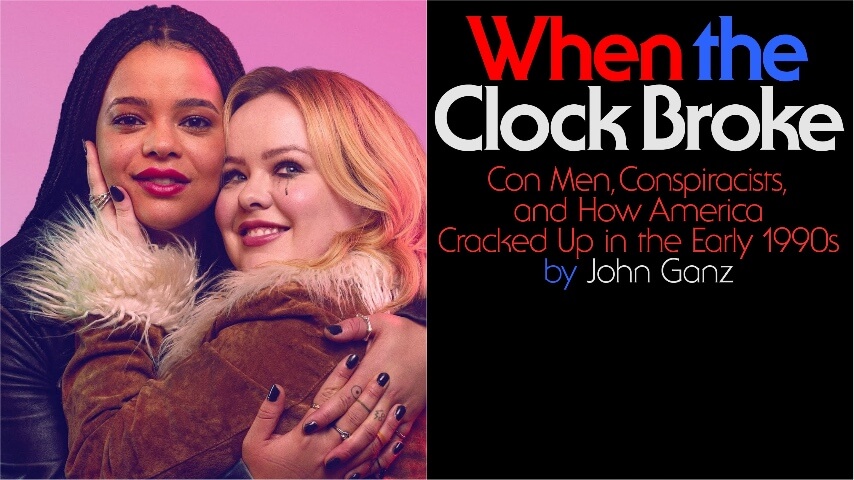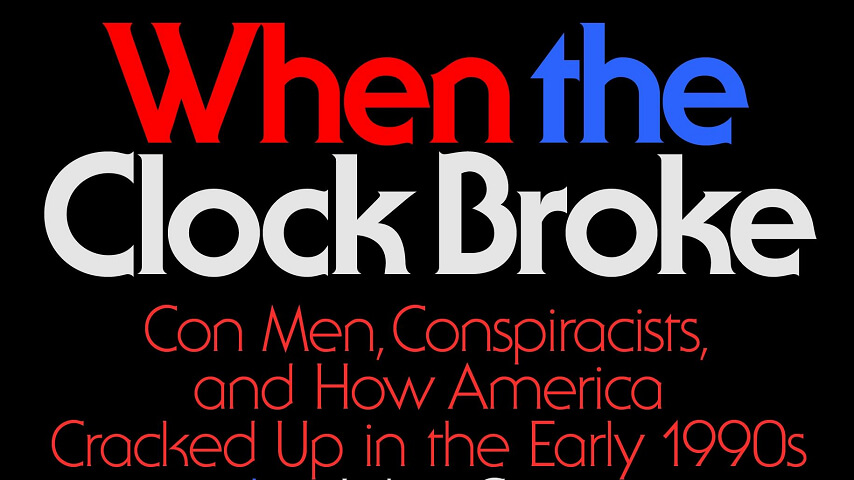Staff Picks: A brilliant millennial dramedy and a look back at '90s political weirdos
Enjoy a Tubi original and/or an extensive look at the radicalization of the right since the 1990s
Left: Lydia West and Nicola Coughlan in Big Mood (Photo: Tubi); Right: Book cover for When The Clock Broke by John Ganz (Courtesy of MacMillan)
In the second October installment of Staff Picks, The A.V. Club recommends a darkly comedic two-hander and a smart primer about the radicalized right (just in time for Election Day).
Big Mood season one (Tubi)
Created by Camilla Whitehill, Big Mood walks the line between comedy and drama with more precision and grace than most shows that fall under the “dramedy” banner. The jokes fly fast and furious in this six-part series, which premiered on Channel 4 in March of this year before being picked up by Tubi (proving once again that you mock this streamer at your own peril). For Maggie (Nicola Coughlan) and Eddie (Lydia West), humor is a defense mechanism that helps take the edge off the dispiriting reality they and most millennials must face. Not that any non-Boomer cohort has it especially easy right now, but Big Mood highlights the singular conflicts of the first real “online” generation, who came of age in the public eye in a way that their predecessors did not. Whitehill, who wrote all of the series’ episodes, observes that jokes may also be keeping Eddie and Maggie, who practically define “BFFs,” from seeing each other for who they are now, and not who they were when they first became friends.
I praised Big Mood when it first arrived Stateside, not least for providing the 2024 TV season with a much-needed jolt of energy. Upon rewatch, it remains a breath of fresh air and an astute look at how even ride-or-die friendships can wither. Coughlan and West immediately make Eddie and Maggie’s relationship feel lived-in, establishing a deep-rooted loyalty that obscures the destructiveness of the path they’re on. The Bridgerton star has the showier of the two roles, which she handles with aplomb, but that just makes West’s work as the long-suffering friend—who’s nonetheless rethinking her place in the dynamic—even more devastating.
Like its two leads, Big Mood has a lot on its mind, mining mental illness and family dysfunction for both drama and laughs. But, and maybe this is just a result of its very British succinctness, the show doesn’t get caught up in being “about something” (see: The Bear). Along with series director Rebecca Asher, Whitehill deftly handles the shifts in tone and theme, never stopping to spell out the latter—well, beyond naming her series Big Mood. There is a bit of a buy-in: You have to acknowledge that even our worst moments can be funny, and that being able to laugh at something doesn’t mean you’re over it. Bittersweet and rousing, Big Mood deserves to be in conversation with the best shows of the year (and, as long as we’re asking for things, a second season). [Danette Chavez]
John Ganz, When The Clock Broke

Cover art for When The Clock Broke by John Ganz
Here’s one for anyone who might be convinced by a Barack Obama endorsement of a political history book, but who wants to hear what the guy who writes video game reviews for The A.V. Club thinks about the topic first: John Ganz’s 2024 tome When The Clock Broke. In this wide-ranging, often darkly funny book from the Unpopular Front writer, Ganz looks back at a political moment that my young brain largely experienced through Dana Carvey impressions on Saturday Night Live: The first Bush administration, and especially the lead-up to the ’92 election.
As Ganz explains in exhaustive detail (occasionally bordering on academic in tone), this period was way more tumultuous than my 2nd grade teacher and/or the “we have reached the end of history”-types would have liked us to believe, as America’s post-Reagan right-wing got genuinely weird, genuinely scary in a very quick way. You can, if you’re so inclined, read the book as a primer on the radicalized right as it exists in our present day—Ganz doesn’t belabor the point, but he’s careful to check in on what a very loud, frequently bankrupt real estate developer named Donald Trump was blabbering about at several different points during his timeline—but it’s also just a great portrait of the emboldening political weirdos of a generation. Ganz has a knack for highlighting the grotesqueries and absurdities of guys like David Duke and Pat Buchanan without ever branching out into outright mockery; if you’ve ever had a “Kin I feenish?” run through your head at random, and realized you don’t actually know what the hell the whole Ross Perot thing was about, well, here’s your book. [William Hughes]